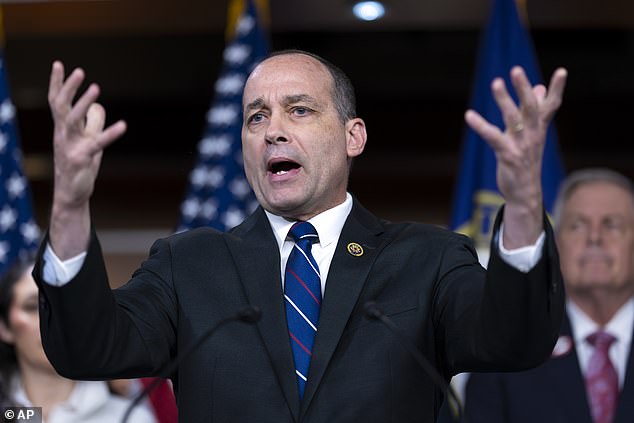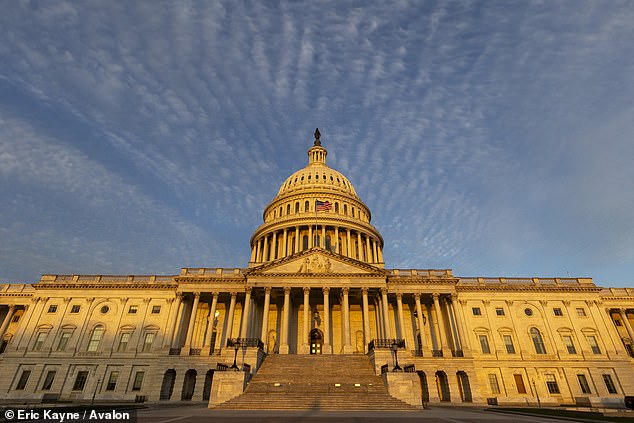Congress’ DEI office is DISBANDED as part of $1.2 trillion funding package: Win for Republicans as diversity office is dissolved and its director announces she is leaving
Tucked into the sweeping $1.2 trillion government funding bill passed by the House of Representatives on Friday was a provision that closed the House Office of Diversity and Inclusion.
Starting Monday, the office will be closed and some of the staff will transfer to the newly established Office of Talent Management.
The nonpartisan Office of Diversity and Inclusion was first established in March 2020 and supports diverse employees with things like resume workshops and professional development grants.
It was the victim of a movement by Republicans to eliminate DEI programs across the country.
“On behalf of ODI, it was an honor to ensure that the US Congress embodied a qualified and representative workforce that reflected the tremendous diversity of the country,” office director Sesha Joi Moon said in a statement to DailyMail.com.
“We would like to thank the Office of the Speaker of the House of Representatives, the Office of the House Democratic Leader, and the Committee on House Administration, as well as the entire House community for their support during the 116th, 117th, and 118th Congresses.”
Just 12 hours before the government funding deadline that would have forced a shutdown, Speaker Mike Johnson shepherded a $1.2 trillion spending package through the House of Representatives.
Now it goes to the Senate, where a successful vote is expected soon.
The final vote on the enormous spending bill was 286 to 134. It is striking that more Democrats voted for the agreement than Republicans. The majority of Republicans – 112 in total – voted against the measure backed by Speaker Johnson.
The 1,000-page measure bundles funding for six of the 12 budget bills that must be approved annually. It bundles almost 75 percent of annual government funding into just one vote, a so-called minibus.
Despite Johnson’s victory, the clock is ticking and the bill still must pass the Senate and be signed by President Biden to avoid a partial government shutdown, which would follow Friday after 11:59 p.m.
The trillion-dollar deal — details of which were only revealed Thursday — will provide money for the Departments of Defense, Financial Services, Homeland Security, Labor-HHS-Education, State Foreign Operations and the Legislature.
Speaker Mike Johnson released details of a $1.2 trillion government funding package on Thursday

House Freedom Caucus Chairman Bob Good, R-Va., urged Republicans to vote against the bill against the Republican Speaker of the House of Representatives
The deal was opposed by many notable conservatives, including Rep. Marjorie Taylor Greene, R-Ga., Rep. Matt Rosendale, R-Mont., Rep. Mike Waltz, R-Fla., and nearly 100 other Republicans.
Greene went so far as to introduce a motion to dismiss the speaker while votes were still underway, angered by his support for massive spending — setting off a tumultuous process that could take the gavel from Johnson.
House Minority Leader Hakeem Jeffries said the bill would pass just before the votes, indicating Democrats largely agree with the deal.
When the final tally was tallied, 185 Democrats rallied with 101 Republicans to get the funding bill passed.
Senate Majority Leader Chuck Schumer has said the Senate Democratic majority would work to approve the agreement earlier this week, calling the deal “good news.”
Schumer boasted that the deal provided funding boosts for child care, disease research, mental health programs and suicide prevention.
Republicans in the Senate have now protested against the agreement.
“The Swamp is pushing this horrible funding bill at lightning speed so that Americans don’t see what’s inside,” Sen. Mike Lee, R-Utah, wrote on X.
Sen. Rick Scott, R-Fla., posted on We have a debt burden of $34 trillion. Washington can’t keep wasting your tax dollars on this stupid nonsense!’
Many conservative Republicans in the House of Representatives were also angry about the measure and the way Johnson rushed to vote on the biblically lengthy bill, which did not give members the usual 72 hours to read the fine print.
“We don’t need 72 hours to vote against a bad bill,” conservative House Freedom Caucus Chairman Bob Good said at a news conference before the vote.
He and like-minded Republicans led the charge in opposing the legislation.
“Why are we in such a hurry to keep open this government that is harming the American people so much through the policies they are suffering under?”
Good criticized the package for maintaining “Pelosi-Schumer policies and spending levels,” noting how the bill actually “increases spending levels by approximately $60 billion.”
Another member of the Freedom Caucus, Rep. Andy Ogles, R-Tenn., said, “It’s clear the Democrats have the gavel in their hands.”
Still, Republican leadership touted conservative victories such as a three percent increase in defense spending while preserving the Hyde Amendment and a ban on restrictions on gas stoves.
But rank-and-file conservatives have mentioned other provisions, such as the $200 million included in the bill for a new FBI headquarters and $300 million going to the Ukraine Aid Initiative.

The House of Representatives approved $1.2 trillion in government funding Friday evening, just hours before a deadline
Congress also approved a $460 billion funding deal on March 8, just hours before the money allocated for the agencies ran out.
The deal “delivered significant Conservative policy victories” amounting to around $460 billion, despite a “divided government” and rejected “left-wing proposals”, Chairman Johnson said at the time.
That bill included funding for six federal agencies – including Commerce-Justice-Science, Energy-Water, Domestic-Environment, Military Construction-VA, and Transportation-HUD.
It also imposed “deep cuts” to the EPA (10%), ATF (7%) and FBI (6%), which Johnson said “have threatened our freedoms and our economy.”
